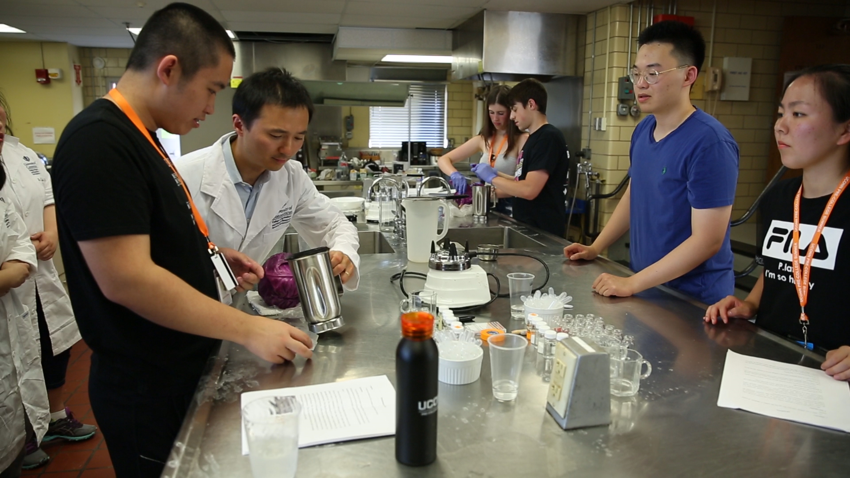
The Department of Nutritional Sciences offers three Pre-College Summer Courses.
Food Science and Technology
Explore the field of food science
You make decisions over numerous food products every single day. Knowing the science and technology behind food products helps you make healthy food choices. The field of food science and technology includes food microbiology and safety, food quality assurance, food engineering and technology, food chemistry, product and formulation development, food packaging, sensory evaluation, food marketing, and food regulations.
In this 1-week introductory course, students will learn:
-
- basic terminologies and concepts of food production
- modern technologies used in the food industry
- physical and chemical changes in food products during storage
- key practices to assure the quality, safety, and palatability of raw and cooked foods
- general facts and relevant food regulations that consumers should be aware of
- career opportunities in the field of food and nutrition
This course is composed of in-class lectures and hands-on laboratory experiments to help students turn their knowledge of the principles of food science into practices as a food scientist.
Faculty: Yangchao Luo, Ph.D., Associate Professor, Department of Nutritional Sciences, University of Connecticut
Human Nutrition and Health
The field of nutritional science explores the interactions between living organisms and food. Exploring nutritional science concepts is applicable to everyday life and a variety of professions that includes medicine, dentistry, pharmacy, nursing, physician assistant, dietetics, education, policy, and the food, retail, and restaurant industry. Taking this course will give you an advantage about how what we eat or drink impacts the functioning of the human body and a person’s health.
This course will introduce you to the field of nutritional science and health. Students will have interactive in-class lectures with videos. In addition, students will use critical thinking skills to complete case studies and hands-on activities individually and small groups to further their understanding about dietary behaviors, nutrients in foods and the human body, and linking nutrient intake to overall health. In addition, students will learn about educational pathways and experiences leading to careers in healthcare, nutrition, and the food industry.
Faculty: Molika Chea, Ph.D., Lecturer, Department of Nutritional Sciences, University of Connecticut
Nutrition for Exercise and Sport
This course focuses on the inter-relationship between nutritional practices and athletic performance. Understanding appropriate nutritional recommendations in relation to exercise or sport training is important for https://precollege-summer.uconn.edu/courses/nutritionathlete health, energy, recovery, and adaptation. Students will learn from an evidence-based curriculum to enhance their knowledge of macronutrient and micronutrient recommendations, nutritional timing strategies, and sport supplements.
Nutrition for Exercise and Sport is composed of in-class lectures and case study activities to help students translate scientific information into practical recommendations for a variety of athletes. Students will get practice reading food labels to plan out meals and snacks that support athletic performance. Upon completion of this course, students will be able to recommend healthy food choices to improve athlete health and fuel exercise performance.
Students will be able to explain the importance of nutritional timing strategies, and how food can be used to optimize athlete health and performance. Further, students will use critical thinking skills to translate scientific information into practical recommendations for a variety of athletic populations.
Faculty: Jennifer Fields, Ph.D., Assistant Professor, Department of Nutritional Sciences, University of Connecticut